Legal Pet Birds: A Complete Guide for Owners
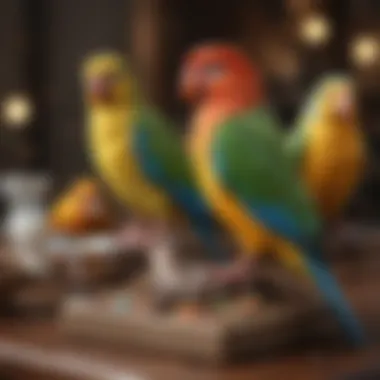
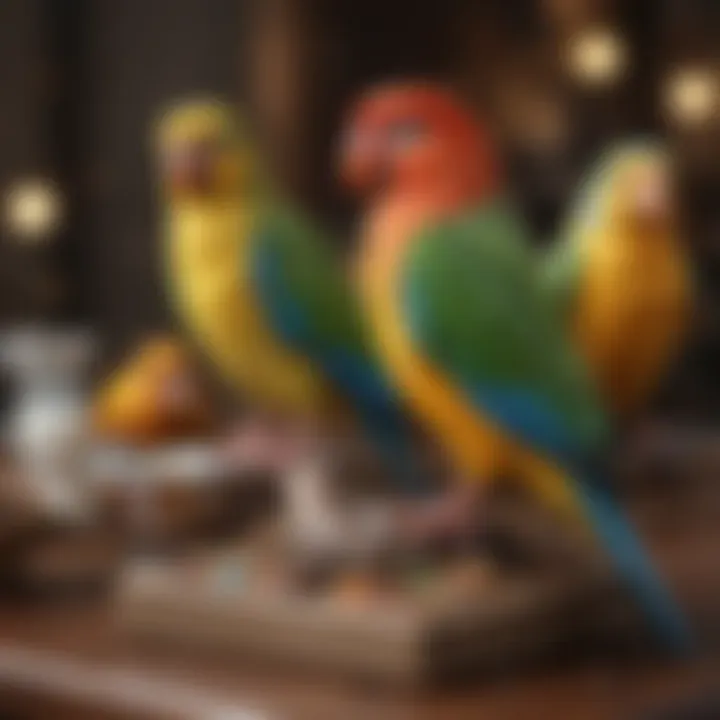
Intro
Birds have a charm that few can resist, and for many, the idea of having one as a pet is as appealing as it gets. But before you even think about bringing home a feathered friend, it’s crucial to understand not just the joys, but also the responsibilities tied to pet bird ownership. This guide seeks to unpick the layers of legal pet birds—from understanding various species to the nuance of their care needs and important regulations surrounding their ownership. The world of pet birds is the rich tapestry of colors, sounds, and behaviors that can add quite a bit of life to your home.
Care Tips
Taking care of a pet bird is not just about food and water; it's about creating an environment where they can thrive. Here’s what you should know:
Daily Care Routines
Daily routines lay the groundwork for a healthy bird. Start the morning by uncovering the cage and letting in natural light, which helps set their internal clock. Fresh water should be replaced each day, and their food needs should be replenished regularly. Don’t forget to engage with them; a few minutes of talking or interacting can go a long way.
Cage Setup and Maintenance
The cage is a bird’s castle. For smaller species like budgies, a cage that measures at least 18 x 18 x 24 inches is the bare minimum. Keep it spacious enough for them to stretch their wings. Use perches of different diameters to promote foot health and include toys to keep them stimulated. Expect to clean the cage at least once a week or more often if you have a messy eater!
Here are some ideas for setting the cage:
- Perches: Wood or rope to provide texture.
- Water bottles: These can help keep the water cleaner.
- Toys: Rotating toys keeps things fresh and exciting for them.
Hygiene and Cleaning Practices
Keeping your bird’s environment clean is vital. Regularly remove droppings and leftover food to prevent harmful bacteria. Use bird-safe cleaning products. Vinegar and water can be effective at disinfecting surfaces while being safe for your bird.
Seasonal Care Adjustments
Certain seasons bring changes in routine. In winter, it’s essential to keep your bird warm, possibly by moving their cage away from drafts or using heating pads. In spring, many birds may tend to molt, during which they may need extra calories and protein.
Behavioral Insights
Understanding a bird's behavior can be as challenging as it is rewarding. Here are some factors to consider:
Understanding Bird Body Language
Birds communicate a lot through body language. A puffed-up bird might be feeling chilly or threatened, while a bird with flattened feathers could indicate relaxation. Flapping their wings might show excitement, while a bird that’s biting or lunging may be feeling cornered or anxious.
Common Behavioral Issues and Solutions
If your pet bird is plucking its feathers or becoming overly aggressive, it may need more stimulation or social interaction. Here’s how to tackle common problems:
- Give them toys to keep their minds busy.
- Promote interaction with other birds if possible.
Positive Reinforcement Techniques
Using treats to reward good behavior is an effective way to reinforce positive habits. For example, if your bird steps onto your hand willingly, offer a small piece of fruit.
Social Interaction Needs
Birds are social creatures. They can become bored or lonely if left alone for too long. Consider adopting a pair, but ensure they’re compatible species. Regular attention from you also helps enhance their social skills.
Nutrition Guides
Nutrition is crucial for your bird's well-being. Let's investigate:
Essential Diet Components
Most birds thrive on a mix of seeds and pellets, supplemented with fresh fruits and vegetables. Some species may require specific nutrients; for instance, parrots often need a higher fat content in their diet compared to finches.
Safe and Toxic Foods
Certain foods are a no-go for pet birds. Always research what’s safe to eat. For example:
- Safe: Apples (without seeds), carrots, and spinach.
- Toxic: Avocado, chocolate, and caffeine.
Supplements and Treats
Consider natural supplements like calcium for some species, especially if they are breeding. Treats should be given sparingly; think of them as the occasional dessert.
Feeding Strategies for Different Species
Keep in mind each bird’s preferences; small parrots may prefer smaller seeds or pellets while larger species can manage larger varieties.
Wellness and Health
Bird health needs constant vigilance. It’s your job to keep a close eye:
Routine Health Checkups
Schedule annual veterinary check-ups to get ahead of potential issues. Catching a problem early can be the difference between a quick fix and more significant health woes.
Identifying Symptoms of Illness
Stay alert to changes in behavior, eating habits, or droppings. Signs like excessive sleeping, ruffled feathers, or unusual vocalizations could indicate that something’s off.
Preventative Care and Vaccinations
Prevention is better than cure. Keep your bird’s living environment clean and ensure they are vaccinated as needed.
Mental and Emotional Well-being
Just like humans, birds need mental stimulation to stay healthy and happy. Consider adding a play gym or rotating toys to keep their environment lively.
Enriching Activities
Boredom can lead to problems, so keep things interesting. Here are some ideas:
Toys and Playtime Ideas
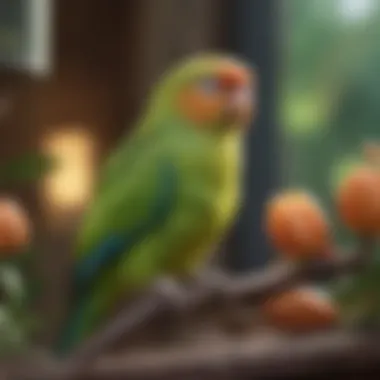
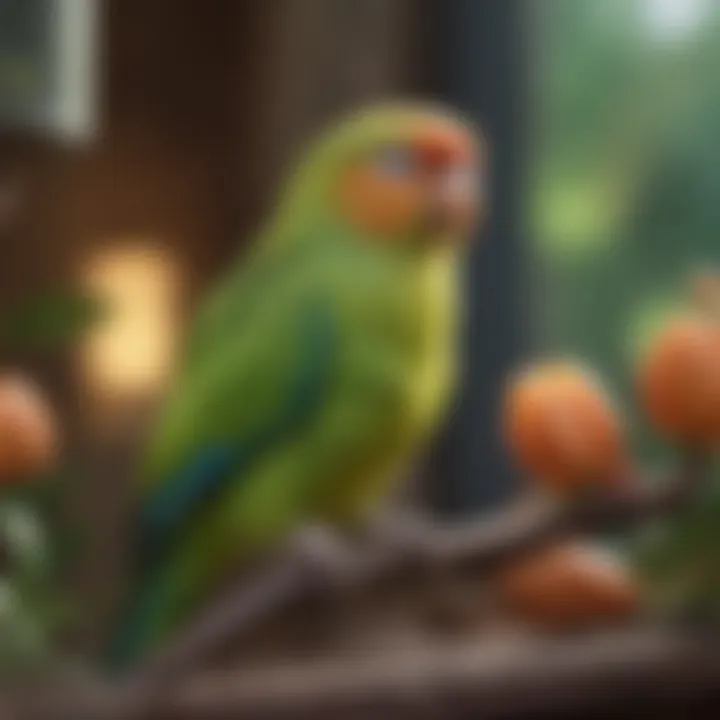
Provide a diverse range of toys: Foraging toys encourage natural behaviors while chewable toys keep their beaks healthy. Consider safe materials like wood or sisal rope.
Training and Tricks
Teaching your bird tricks not only keeps them entertained but also helps build your bond. Start with simple commands, each rewarded with a treat.
Outdoor Activities and Interaction
When temperature permits, allow your bird some outdoor time. Use a safe bird harness or a secure aviary for bird-friendly excursions.
DIY Projects for Mental Stimulation
Get creative! From hide-and-seek games to homemade foraging toys, projects can be simple and effective.
Remember: A happy bird is a healthy bird; consider their mental and emotional needs just as you would their physical health.
This comprehensive guide aims to enlighten both new and seasoned bird owners into the exquisite and delightful world of pet birds. Knowing the ins and outs of legal requirements, care tips, and the nuances of bird behavior will not only elevate your experience but ensure that your avian friends lead fulfilling lives.
Understanding Pet Bird Legislation
Understanding the laws surrounding pet birds is crucial for both current and prospective bird owners. Not only does this knowledge help in ensuring compliance with various regulations, but it also fosters a culture of responsible ownership. These laws can help protect both the avian companions and the owners from potential legal issuess that arise from miscommunication or ignorance of the rules.
Diving deeper into the legal landscape for pet birds, we find that navigating these waters requires awareness of specific nuances that can vary widely from one region to another. The laws reflect not just a desire to protect certain species but also to play a role in conservation efforts. As such, our exploration of bird legislation will shine a light on critical aspects like what species you can legally keep, what the requirements are for owning these creatures, and the penalties for non-compliance.
Overview of Avian Laws
The framework for avian laws is both broad and detailed. Generally, these laws are primarily established to prevent the illegal trade and possession of endangered species. Governments worldwide have recognized that many species are in jeopardy, mostly due to habitat loss and poaching. As a protective measure, laws often require pet owners to obtain special permits or licenses—especially in the case of exotic bird species like the Scarlet Macaw or the African Grey Parrot.
Many of these laws are informed by international agreements such as the Convention on International Trade in Endangered Species of Wild Fauna and Flora (CITES). This treaty aims to ensure that international trade in wild animals and plants does not threaten their survival. The challenge for bird owners is staying informed about the sometimes-changing status of these regulations, as legal requirements can shift based on conservation assessments.
Regional Variances in Bird Ownership
Laws affecting bird ownership can vary dramatically from region to region. In the United States, for example, the laws can differ not just across states but also within local jurisdictions. While some places might allow a wide variety of pet birds, others might have specific bans in place that could surprise even seasoned bird owners.
In addition to state laws, municipalities often have their own ordinances. For instance, in New York City, it’s illegal to own certain types of birds like pigeons, while in a more rural setting, the restrictions might be less stringent. Bird owners must carry out due diligence to know what’s permissible in their area.
"Owning a pet bird brings joy, but understanding the surrounding laws is part of that joy."
Permitted versus Prohibited Species
When it comes to selecting a pet bird, understanding the classifications of permitted and prohibited species is paramount. Each country and region will have its list, derived from both conservation concerns and local ecology.
Permitted species generally include birds that are bred in captivity and commonly domesticated such as:
- Budgerigars (Parakeets)
- Cockatiels
- Canaries
- Lovebirds
- Finch species
Prohibited species, on the other hand, often include those that are endangered or those that could pose a threat to local wildlife if released into the wild. This includes exotic species like:
- African Grey Parrots (in some states)
- Various species of Macaws
- Cockatoos
- Wild finches
This delineation is crucial. Choosing a bird that is not legally permitted can lead to hefty fines or even confiscation of the pet. It's also worth mentioning that some birds may be allowed with specific licensing or permits. Thus, it pays off to check with local wildlife agencies or repositories of information, such as state wildlife departments.
Engaging in responsible bird ownership starts by understanding these laws and adhering to them, making it best for both the bird and the owner.
Popular Legal Pet Bird Species
Understanding the various species of legally permissible pet birds is crucial for anyone considering these feathered companions. Each bird type comes with its own set of traits, care requirements, and quirks that can enhance or challenge the ownership experience. Opting for a pet bird isn't just about choosing a pretty face; it's about aligning their lifestyle needs with yours. This section dives deeply into popular species, helping enthusiasts make informed choices while highlighting their unique characteristics and benefits.
Parakeets: A Colorful Companion
Parakeets, often recognized by their vibrant colors and playful nature, are among the most popular pet birds worldwide. These small birds, also known as budgerigars, offer a wonderful personality that captivates many. They are social creatures, thriving on interaction with their owners and fellow birds. Its small stature doesn't limit their intelligence. In fact, parakeets can learn to mimic sounds and words, adding a delightful auditory element to their presence.
- Size and Space: They require a modestly-sized cage but appreciate room to fly within a safe environment.
- Social Nature: It's wise to keep them in pairs or small groups to avoid loneliness.
- Care: Routine health checks, a nutritious diet, and daily interaction will keep these birds happy.
In short, parakeets are ideal for first-time bird owners who want a lively and affectionate companion.
Cockatiels: Affectionate and Social
When it comes to affectionate birds, cockatiels take the cake. These charming little guys are known for their friendly demeanor and distinctive crests. They are particularly engaging and often form strong bonds with their owners. Cockatiels tend to enjoy playing or being petted, making them one of the more interactive pet birds available.
- Vocalization: They are known for their ability to whistle tunes or mimic sounds, which tends to be endearing.
- Care Needs: Like parakeets, cockatiels need interaction and mental stimulation to prevent boredom.
- Diet: A well-balanced diet consisting of pellets, seeds, and fresh fruits can keep them healthy.
It's worth noting that a lack of socialization can lead to behavioral issues, so owners should be prepared to invest time in building a relationship with these delightful creatures.
Canaries: Musical Personalities
Canaries bring a unique musical flair to the pet bird scene. While they are not typically known for their ability to interact like cockatiels or parakeets, their captivating song can fill a home with joyful sound. Breeding has resulted in an array of colors and patterns, making canaries aesthetically pleasing.
- Cage Requirements: They prefer a spacious cage with enough room to fly, as they need exercise to stay healthy.
- Solitary Nature: Canaries are often better as solo pets since they can be territorial.
- Diet: Seeds, greens, and occasional fruits are essential for their well-being.
Offering a canary as a pet means welcoming music into your home, but it also calls for an understanding of their specific needs and solitary behaviors.
Lovebirds: Bonds Beyond Compare
Lovebirds live up to their name, fostering profound bonds with their human companions. You may notice how they snuggle up or engage in grooming behavior, which showcases the strong emotional connections they can form. Their affectionate nature makes them a popular choice for those looking for a loving partner.
- Size & Social Needs: These birds are small, but their social needs are vast. They thrive best in pairs but can also bond closely with their owners if kept alone.
- Playfulness: They require stimulation through toys and interaction to prevent boredom.
- Diet: A mix of seeds, pellets, and fresh veggies is vital in maintaining a healthy lifestyle.
For those ready to engage heart and soul, lovebirds offer companionship unparalleled by many other species.
African Grey Parrots: Intelligent Companions
African Grey Parrots are often regarded as one of the most intelligent pet birds. Their exceptional cognitive abilities allow them to learn words and phrases, often demonstrating the ability to reason and understand context. This intelligence does come with its challenges, requiring dedicated care and understanding.
- Cognitive Enrichment: Owners should provide toys that stimulate their minds and encourage problem-solving.
- Social Interaction: Like lovebirds, they crave social interaction and thrive on attention, making them more of a commitment.
- Diet: Their diet must be diverse, incorporating fresh fruits, vegetables, seeds, and specialized pellets.
It's important to consider that while their intelligence can be a joy, it also means they require attentive care and a stimulating environment to keep them happy and healthy.
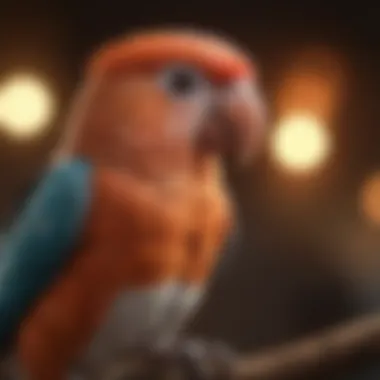
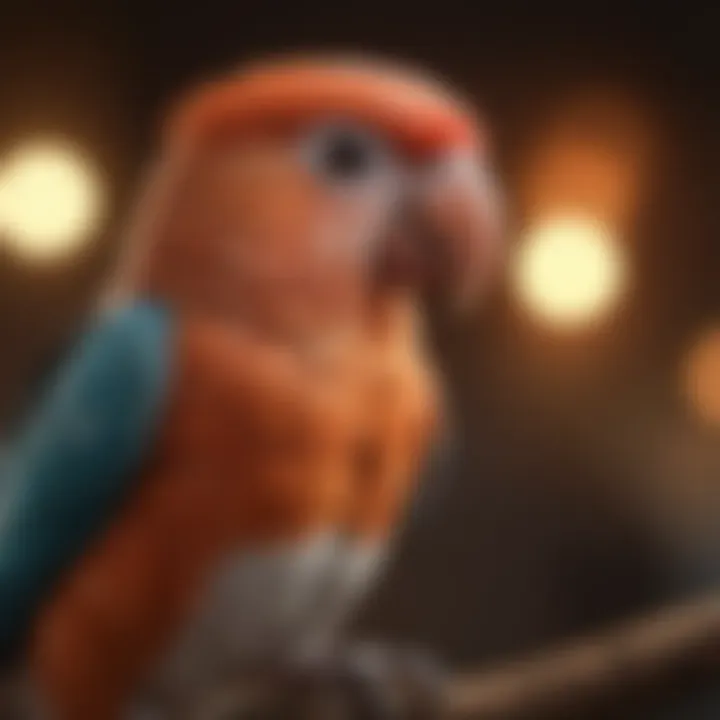
Owning a pet bird is more than just about the animal you choose; it's about understanding their needs and integrating them into your life thoughtfully.
Factors to Consider Before Adopting a Pet Bird
Adopting a pet bird is not simply a spur-of-the-moment decision; it's one that comes with a waterfall of responsibilities and commitments. Before you bring home a feathered friend, it’s crucial to consider various factors that can impact both your life and the bird’s well-being. This section delves into the essential aspects of bird ownership, focusing on space, time, and financial implications that every potential bird owner should ponder.
Space Requirements
Space is often the unsung hero when it comes to fostering a happy and healthy environment for a pet bird. Birds, by nature, are not just simple creatures that sit pretty in a cage; they need room to spread their wings figuratively and literally. Different species have varying space needs, so understanding those can guide your decision-making.
A parakeet, for instance, can thrive in a smaller cage but will benefit from a play area or a flight space. In contrast, larger birds, like African Grey parrots, require more generous surroundings for their physical and mental health. You might consider dedicated areas where they can fly about safely, stimulating their minds and bodies. Think about the layout of your home. Can you allocate an area with a perch where the bird can observe household activities? This is significant for their social development.
Time Commitment for Care
Caring for a pet bird is more than filling a bowl with seeds; it's about building a relationship through daily interaction. Time is a critical element here. Birds are social creatures, and depriving them of companionship can lead to behavioral issues like feather plucking or excessive screeching. Ideally, you should invest at least an hour each day engaging with your feathered companion, whether that’s through talking, training, or simply letting them out of their cage for some flying around.
Combine this time with regular cleaning of their habitat, which helps ensure a healthy living space. If you’re often tied up with work or social obligations, consider how this might affect your ability to give adequate attention to your bird. Learn about their social needs and ensure you're equipped to meet them.
Financial Implications
When thinking about bringing home a bird, the checkbook is one area that warrants serious thought. The initial cost may not be as daunting compared to other pets, but alongside the upfront expenses of the bird itself, one must account for ongoing costs. This covers food, bedding, toys, vet visits, and potential supplies necessary for their mental stimulation and health.
For instance, premium bird food varies significantly in price, and you’ll want to factor in the cost of occasional vet check-ups. Additionally, quality toys that stimulate your bird's brain often come with their own price tags.
To illustrate, here's a rough idea of potential costs:
- Cage and accessories: $100 - $500
- High-quality bird food: $20 - $40/month
- Veterinary care (annual check-up): $50 - $200
- Toys and enrichment: $10 - $30/month
Before you leap into bird ownership, ensure you’re financially prepared. This isn’t just a commitment to a pet, but to a quality of life for both you and your bird.
"A pet is a commitment of love, space, time, and money. Be sure you’re ready to give all the above before welcoming a new feathered family member into your life."
In summary, taking the time to evaluate these crucial factors—space, time, and finances—will ensure you’re set for success in your journey of bird ownership. It's not just about having a bird; it's about creating a nurturing environment that allows both you and your feathered friend to thrive.
Basic Care Guidelines for Legal Birds
Caring for pet birds isn't just about owning them; it's about ensuring their health and well-being throughout their lives. A solid grasp of basic care guidelines is essential for any bird owner, as it directly impacts the quality of life of these feathered companions. This section delves into the fundamental aspects of care—nutritional needs, habitat setup, and socialization. These elements combine to create a nurturing environment where your bird can thrive both physically and mentally.
Nutritional Needs
One of the most crucial aspects of pet bird care is providing a balanced diet. Birds, much like humans, can suffer from a variety of health issues if their nutritional requirements aren’t met. The diet should ideally consist of a mix of seeds, pellets, and fresh fruits and vegetables. Pellets are often recommended as they provide a well-rounded, fortified nutritional base.
Consider these categories when planning your bird’s diet:
- Seeds and Pellets: Most birds enjoy seeds, but they should be provided as part of a broader diet. Pellets offer essential vitamins and minerals. Look for options like Harrison's Bird Foods or Kaytee's Exact.
- Fresh Produce: Greens like kale, broccoli, or carrots are excellent, but avoid avocados as they can be toxic to birds.
- Occasional Treats: Nuts and seeds can serve as a treat but should not be the mainstay of their diet.
Getting it right isn't always easy. Watch your bird's behavior; a sudden change in appetite can indicate health issues. Just like a well-balanced harmony, nutrition plays an essential role in the overall health and lifespan of your pet bird.
Habitat Setup
The environment you create for your bird can significantly affect its physical and psychological well-being. An appropriately placed cage, along with various accessories, can help satisfy your bird's instincts and keep it busy.
Key considerations for habitat setup include:
- Cage Size and Type: Ensure that the cage is spacious enough for your bird to stretch its wings and move around comfortably. For small birds like canaries, a horizontal cage allows for flying, while larger species like African Grey Parrots need a bigger setup.
- Perches and Accessories: Include perches of different diameters and materials to promote foot health. Adding toys can help stimulate your bird’s mind and keep it engaged.
- Cleanliness: Regular cleaning is essential. A dirty cage can lead to illness. Spend a few minutes every day checking for droppings and replacing bedding to maintain a hygienic environment.
Creating a stimulating and clean environment not only keeps your bird happy but also promotes long-term health.
Socialization and Interaction
Birds are inherently social creatures and require regular interaction to remain happy and mentally sharp. Lack of socialization can lead to behavioral issues, including aggression or depression. Connecting with your bird often is not just beneficial; it's vital for its well-being.
Strategies for fostering social interaction include:
- Quality Time: Dedicate time each day to interact with your bird. Simple things like talking, whistling, or singing can build rapport.
- Training Sessions: Engage in basic training using positive reinforcement. Tricks, sounds, or simple commands can enhance the bond between you and your pet.
- Bird Friends: If feasible, considering a second bird can provide companionship. However, be mindful of the dynamics, as not all species will get along.
"A bird in a happy environment is a healthy bird."
Investing in socialization and interaction enriches not just your bird's life but also your own. Having a pet bird should feel like having a friend who reciprocates curiosity and affection in a delightful dance of companionship.
Ensuring that you meet these basic care guidelines is fundamental to being a responsible bird owner. From diet to habitat, and interaction, these elements work together for a fulfilling life for your beloved pet.
Health Considerations for Pet Birds
When you decide to welcome a feathered friend into your home, understanding their health needs is paramount. Proper health considerations for pet birds not only enhance their quality of life but also strengthen the bond between you and your avian companion. Birds are often considered delicate creatures, and as a pet owner, being attentive to their health is essential for longevity and happiness.
Common Health Issues
Pet birds face specific health challenges that can arise due to various factors such as genetics, diet, habitat, and care practices. Here are a few common health issues to keep an eye on:
- Respiratory Problems: Birds are susceptible to respiratory issues, largely influenced by their environment. Dust, smoke, and mold can contribute.
- Feather Plucking: This could indicate stress, boredom, or medical problems. It's more than just a bad habit.
- Obesity: Overweight birds can lead to a host of problems—think heart disease and fatty liver. Diet plays a key role here.
- Psittacosis: A bacterial infection common in parrots, it's crucial—for both you and your bird—to recognize and treat early.
Addressing these health matters requires observation and proactive care. Regular check-ups with an avian vet can help in catching issues before they escalate.
Preventive Care Regimens
Prevention is the name of the game when it comes to maintaining your bird's health. Creating a preventive care regimen is not just beneficial; it's essential. Here are some strategies:
- Regular Vet Visits: Just like your dog or cat, your bird needs routine checkups. An avian vet knows how to catch potential issues early.
- Balanced Diet: Offer a mixture of high-quality pellets, fresh fruits, and vegetables. Each species has its own dietary needs, so make sure to research this thoroughly.
- Environmental Enrichment: To curb behavioral issues like feather plucking, provide toys and activities. A bored bird is a riskier pet to have, as they may resort to destructive behaviors.
- Quarantine New Arrivals: If you're welcoming a new bird, ensure it’s quarantined for a few weeks before introducing it to your other birds. This measure helps prevent the spread of any diseases.
A small investment in preventive care can save you from larger veterinary bills down the line.
Recognizing Signs of Illness
Being able to read your bird’s body language and behavior is fundamental to spotting potential health issues. Early recognition can be a lifesaver. Here are some signs to watch for:
- Changes in Appetite: If your bird isn’t eating or drinking as normal, it could be a sign of sickness.
- Lethargy: While birds enjoy their beauty sleep, excessive tiredness or lack of movement can suggest trouble.
- Altered Droppings: Variations in the color or consistency of droppings are often the first indicators of health problems.
- Muffled Vocalizations: If your chatty parrot suddenly stops talking or sounds raspy, it's worth investigating.
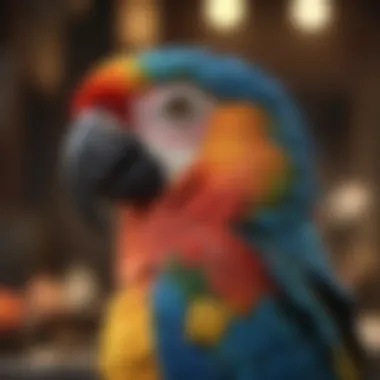
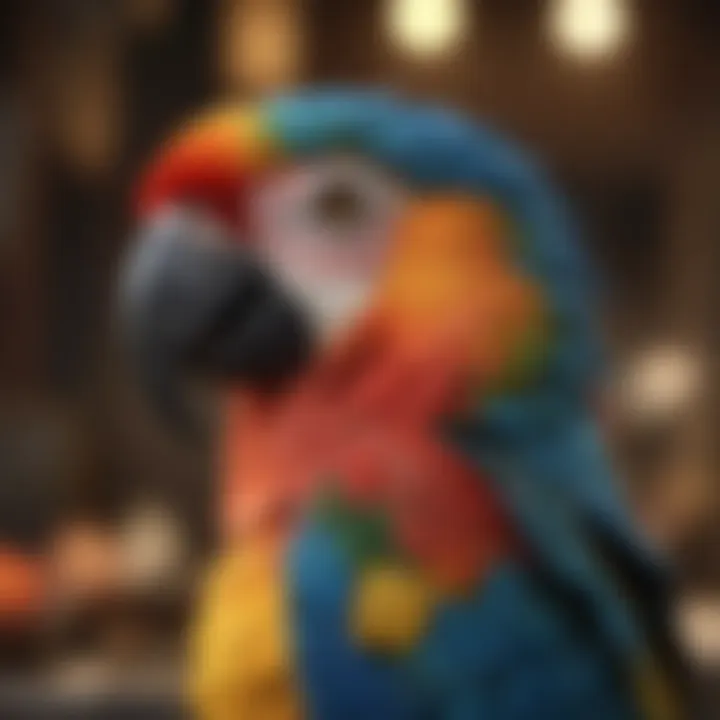
Being attuned to your bird's typical behavior will help you catch any signs that something's off.
Legalities of Bird Breeding
The topic of bird breeding has gained traction among avian enthusiasts and potential pet owners alike. Understanding the legal aspects of breeding birds is paramount, not just for compliance, but also for the welfare of the birds themselves and the broader ecosystem. Legalities can vary significantly based on local, state, and federal laws; hence, a firm grasp of these regulations is essential before considering breeding as a hobby or business venture.
Bird breeding isn't merely a matter of pairing birds together to produce offspring. It involves responsibility, ethics, and knowledge of the inherent risks involved. For example, improper breeding practices can lead to health issues, genetic problems, or neglect of the mother bird. Thus, familiarizing oneself with the legal frameworks surrounding bird breeding becomes a prerequisite for any responsible owner.
Understanding the regulations that govern bird breeding not only helps in protecting a breeder from legal troubles but also preserves the integrity of bird populations around the world.
Understanding Breeding Regulations
Breeding regulations encompass a variety of rules established to ensure both the welfare of the birds and the preservation of species. In many regions, breeders are required to obtain specific permits, adhere to guidelines concerning housing and care, and comply with zoning laws. These regulations are designed to mitigate the risk of overpopulation, ensure good breeding practices, and discourage illegal wildlife trade.
- Permits and Licensing: Depending on the region, obtaining a breeding permit may be mandatory, especially if a breeder plans to sell the birds. Regulations may also differ based on the species being bred, as some species are highly regulated due to conservation concerns.
- Health Standards: Breeders are often responsible for maintaining a certain standard of health for their birds. This can include regular veterinary check-ups, vaccination records, and ensuring that breeding conditions are sanitary and stress-free.
- Specific Laws: Some areas have laws regarding breeding certain species, especially those considered endangered or threatened. Breeders should be well-versed in the statutes applicable to the birds they intend to breed.
Permitted Breeding Practices
Permitted breeding practices lay the groundwork for ethical and responsible breeding. They are crucial in distinguishing hobby breeding from commercial breeding, which often holds stricter regulations.
- Pair Selection: Knowledge about genetics is essential for ethical breeding. Selecting pairs based on ideal temperaments and health can lead to healthier offspring. It is vital to avoid inbreeding, which can pose significant health risks.
- Adequate Housing: Breeding birds should have ample space, both for their needs and the needs of their fledglings. Nesting boxes should be appropriate for the species, and separate areas may be necessary to minimize stress during the breeding cycle.
- Care and Nutrition: Providing a balanced diet during breeding requires attention. Specialized diets that cater to the nutritional needs of breeding birds can enhance the health of both parents and chicks.
- Education on Care: Continuous education on the latest breeding practices, veterinary care, and species management can significantly aid in producing healthy birds. Joining local avian clubs or participating in workshops can be very useful.
In summary, navigating the legal landscape of bird breeding is not only about complying with regulations but also about fostering a spirit of responsible ownership. By understanding the laws and acceptable practices, breeders can contribute positively to the pet bird community, ensuring that both their birds and prospective owners have enriching experiences.
Finding Reputable Sources for Pet Birds
Navigating the journey of pet bird ownership begins with sourcing your feathered friend from the right place. This is not just about purchasing a bird; it’s about ensuring that you provide a loving home to a healthy animal that has been ethically raised. Understanding the importance of this topic is paramount as it influences the well-being of the bird and the experience of the owner. An informed choice leads to a bond that can flourish in a supportive environment.
Adoption from Shelters
Adoption from shelters serves as a beacon of hope for many unwanted birds needing a loving home. Shelters and rescue organizations often house abandoned or neglected parrots, budgies, cockatiels, and other species, yearning for a second chance. Engaging with these places denotes compassion and can lead to remarkable transformations for both you and the bird.
Consider these advantages:
- Variety: Shelters often have a diverse selection of species and personalities. You might stumble upon a laid-back cockatoo or a cheeky budgie that steals your heart.
- Health Benefits: Many organizations ensure that their birds are checked by a vet before adoption, providing you peace of mind that your new companion is healthy.
- Support: Shelters frequently offer resources and support post-adoption to help you navigate any issues, whether it’s behavioral or health-related.
If you are looking to adopt, check local animal shelters or organizations dedicated to avian rescue. Websites like avianhaven.org can help you find resources in your area.
Selecting Ethical Breeders
When adopting from ethical breeders, it’s crucial to look beyond pretty cages and appealing colors. A good breeder prioritizes the health and welfare of their birds over profits and is transparent about their breeding practices. Here are some key factors to consider:
- Visit the Breeding Facility: If possible, try to visit the breeder’s location. Observe cleanliness and the environment where birds are kept. Ensure that the birds appear well cared for and are not living in overcrowded conditions.
- Health Assessments: A reputable breeder should be willing to provide health records and information on vaccinations.
- Open Communication: They should be open to questions regarding the species, dietary needs, and socialization. Knowledgeable breeders will provide guidance on the bird’s behavior and needs.
Avoiding Illegal Pet Trades
The shadowy realm of illegal pet trades poses significant risks to both the birds and prospective owners. Birds harvested illegally often suffer abuse and neglect, leading to a host of health problems. To safeguard both your well-being and that of your prospective bird, adhere to these precautions:
- Research Legality: Make sure the species you wish to purchase is legal to own in your region. Some species are protected and cannot be sold without special permits.
- Be Skeptical of Unusually Low Prices: If the price seems too good to be true, it probably is. Suspiciously cheap birds may indicate illegal sourcing or unhealthy animals.
- Ask for Certifications: Legitimate sellers should have the necessary permits to breed or sell birds. Ask to see these documents before finalizing any purchase.
"Purchasing from legal, reputable sources not only protects the bird species but also ensures you bring home a healthy, well-adjusted companion."
By adhering to these guidelines when embarking on your journey to find a pet bird, you are not just fulfilling a desire for companionship. You are also contributing to a larger mission of responsible ownership and welfare that benefits the avian community on the whole.
Navigating the bird-keeping landscape wisely not only empowers you as an owner but also fosters a sense of optimism for future bird companions.
Enhancing the Life of a Pet Bird
Enhancing the quality of life for pet birds is critical not just for their well-being, but also for creating a harmonious living environment for both the birds and their owners. Birds are intelligent creatures with complex needs, so offering them a stimulating and engaging lifestyle can lead to a happier and healthier pet. Addressing their behavioral, social, and physical needs creates an atmosphere in which both owner and bird can thrive, allowing for deeper connections and long-lasting companionship.
Toys and Enrichment Activities
When it comes to entertainment, it’s not just child’s play—birds also require mental stimulation to keep boredom at bay. Various toys made of different materials like wood or rope can capture a bird's interest. These include:
- Puzzle toys that encourage problem-solving and prevent frustratrion.
- Swinging toys to promote physical activity and help with balance.
- Foraging toys that allow birds to dig and search for treats, tapping into their natural instincts.
Regularly swapping out toys keeps things fresh and inviting. Owners should consider the size and species of their bird when selecting playthings; larger birds may need more robust toys to stand up to their stronger beaks. Creating an engaging atmosphere with varied enrichment activities is essential for fostering a bird's natural behaviors while also providing a fun environment.
Creating a Social Environment
Birds are naturally social creatures, and they thrive in environments where they feel connected. Several factors can enhance the social life of a pet bird:
- Interaction with Humans: Regular talking, singing, or even playtime can help in building trust and companionship. Spending quality time daily is crucial—perhaps while watching TV, having a chat, or simply being in the same room.
- Bonding with Other Birds: If possible, considering a companion bird can provide social interaction that mimics their natural flock behavior. But this step should be taken with caution; it’s vital to ensure both birds have compatible personalities.
Birds left alone too often can develop behavioral problems like feather plucking or excessive screeching. Ideally, creating a lively and welcoming setting will prevent feelings of loneliness, improving their overall disposition.
Remember: A happy bird tends to sing more.
Traveling with Your Bird
Traveling can be a double-edged sword; it brings its own set of challenges and highlights the importance of preparing well. Birds can be curious about their surroundings but also feel stress in unfamiliar places. Here are some tips for a smoother journey:
- Familiarize Your Bird: Before hitting the road, spend some time in the travel carrier to make it feel like a safe space.
- Comfort Essentials: Always bring along their favorite toys, a blanket, and of course, their preferred food and water containers. These comfort items help ease anxiety when away from their primary habitat.
- Secure Traveling: Ensure that the carrier is sturdy and well-ventilated. Placing the carrier on the floor of the car, away from direct sunlight and drafts, can also minimize possible stress.
- Routine Stops: If traveling for a long time, plan for rest breaks where the bird can have some fresh air (in a safe environment).
Each of these practices ensures that your bird doesn’t just survive travel but enjoys it. Keeping their comfort front and center can make all the difference.
Closure: Responsible Bird Ownership
Owning a pet bird goes beyond mere companionship; it carries with it a set of responsibilities that should never be taken lightly. As you dive deep into the fascinating world of avian pets, it’s crucial to grasp the profound implications of being a bird parent. Responsible bird ownership encompasses understanding the needs, behaviors, and legalities involved in caring for your feathered friends.
The benefits of responsible ownership are not just self-serving; they extend to the welfare of the birds themselves. When pet owners educate themselves about the various species and their unique requirements, they foster a healthier, more stimulating environment for their pets. Knowledge on nutrition, socialization, and healthcare ensures that your bird not only lives longer but thrives in your care.
Considerations about responsible ownership include the commitment of time and resources. Birds are social creatures and require attention, interaction, and proper space. Ignoring these needs can lead to behavioral issues, such as excessive screaming or self-destructive habits. Therefore, set aside time daily to engage with your pet to nurture their emotional health.
Additionally, awareness of the legal landscape surrounding bird ownership promotes ethical and informed decisions. Laws can vary widely depending on your region, limiting the types of birds you can own or requiring permits for certain species. Ignorance of these regulations can result in fines or even losing your pet.
"Responsible ownership leads to not only a fulfilling experience for the owner but also a better quality of life for the bird."
In sum, understanding your role as a pet bird owner illuminates the path toward a rewarding partnership with your avian companion. Not only do you ensure that you are compliant with laws and regulations, but you also demonstrate a commitment to their well-being. Ultimately, your journey in bird ownership enriches both your life and the life of your pet.
Summary of Key Points
- Comprehension of Needs: Understand your bird's social, physical, and dietary needs for a thriving environment.
- Time Commitment: Allocate daily time for interaction to prevent behavioral issues.
- Legal Awareness: Stay informed about local laws and regulations regarding pet bird ownership.
- Health and Welfare: Engage in regular health check-ups and preventive care to safeguard your bird’s well-being.
- Ethics Over Convenience: Choose ethical sources for your pet birds to combat illegal pet trade and promote animal welfare.
By adhering to these principles of responsible bird ownership, you guarantee not just a pet but a lifelong bond rooted in mutual respect and care.















